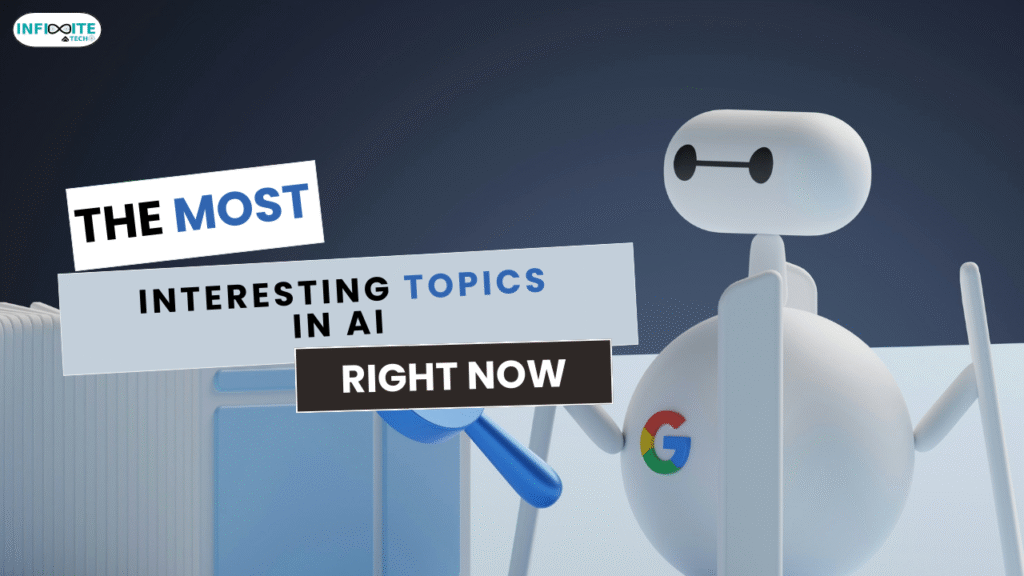
Topic in AI Top Trends and Innovations Right Now
Artificial Intelligence (AI) is no longer a futuristic concept; it’s a present-day reality transforming industries across the globe. Whether you’re leading a large enterprise, managing a startup, or working within the public sector, understanding the top trends and innovations in (AI Topic in AI)is crucial to staying competitive and relevant in today’s fast-paced world.
In this blog post, we’ll explore the most significant AI developments of 2025, delve into how they’re reshaping various sectors, and provide actionable insights on how you can harness these advancements to drive success in your organization.
Why AI Is the Game-Changer of 2025
AI’s impact is profound and far-reaching. Here’s why it’s the game-changer of 2025:
- Ubiquitous Integration: AI is embedded in everyday tools—from virtual assistants to recommendation systems—making it an integral part of daily life.
- Enhanced Efficiency: Automation powered by AI is streamlining operations, reducing costs, and increasing productivity across industries.
- Data-Driven Decision Making: AI’s ability to analyze Topic in AI vast amounts of data enables more informed and timely decision-making.
- Personalized Experiences: AI tailors services and products to individual preferences, enhancing customer satisfaction and loyalty.
Understanding these points highlights the importance of staying abreast of AI developments to leverage its full potential.
Surprising Statistics That Showcase AI’s Impact
To grasp the magnitude of AI’s influence, consider these compelling statistics:Topic in AI
- Revenue Growth: Businesses that have integrated AI report an average revenue growth of 34% and a 38% reduction in costs. crescendo.ai
- Adoption Rates: Approximately 50% of Australian businesses are now utilizing AI solutions, with one new adoption occurring every three minutes. crescendo.ai
- Efficiency Gains: The inference cost for systems performing at the level of GPT-3.5 has dropped over 280-fold between November 2022 and October 2024, making AI more accessible and affordable. Stanford HAI
These statistics underscore AI’s transformative power and the urgency for organizations to adopt AI technologies to remain competitive.
Exploring the Top AI Trends and Innovations of 2025
1. AI Agents and Autonomous Systems
AI agents are evolving from simple chatbots to sophisticated systems capable of performing complex tasks with minimal human intervention. These agents can reason, plan, and learn from interactions, making them invaluable in customer service, logistics, and decision-making processes. Google Cloud
2. Generative AI
Generative AI models, such as GPT-5 and Google’s Gemini, are revolutionizing content creation, software development, and even scientific research. These models can generate human-like text, code, and images, enabling faster innovation and creativity. Forbes
3. AI in Healthcare
AI is transforming healthcare by enabling personalized medicine, improving diagnostics, and streamlining administrative tasks. AI-driven tools are assisting doctors in identifying diseases early, customizing treatment plans, and managing patient data more efficiently. Source
4. AI in Finance and FinTech
In the financial sector, AI is enhancing fraud detection, automating trading, and providing personalized financial advice. Machine learning algorithms analyze market trends and customer behavior to make real-time investment decisions, improving accuracy and profitability. Google Cloud
5. AI in Manufacturing and Industry 4.0
AI-powered robotics and predictive maintenance systems are optimizing manufacturing processes, reducing downtime, and increasing production efficiency. These innovations are central to the Industry 4.0 movement, which integrates smart technologies into manufacturing. Exploding Topics
6. AI in Retail and E-Commerce
AI is enhancing customer experiences in retail by providing personalized recommendations, optimizing inventory management, and enabling dynamic pricing strategies. Retailers are leveraging AI to understand consumer preferences and tailor their offerings accordingly. IBM
7. AI for Eco-Conscious Consumers
AI is aiding in sustainability efforts by optimizing energy usage, reducing waste, and promoting eco-friendly practices. Smart grids, AI-driven recycling systems, and sustainable supply chain management are helping businesses and consumers minimize their environmental impact. McKinsey & Company
8. AI in Education and EdTech
AI is personalizing learning experiences, automating administrative tasks, and providing real-time feedback to students and educators. Adaptive learning platforms and AI tutors are making education more accessible and tailored to individual needs. Source
How to Transition to Using AI in Society
Adopting AI technologies requires a strategic approach. Here’s how organizations can transition effectively:
1. Assess AI Readiness
Evaluate your organization’s current capabilities, infrastructure, and workforce skills to determine readiness for AI adoption.
2. Identify AI Opportunities
Pinpoint areas within your operations where AI can add value, such as automating repetitive tasks, enhancing customer service, or improving decision-making processes.
3. Choose the Right AI Tools
Select AI tools and platforms that align with your organization’s needs and goals. Consider factors like scalability, ease of integration, and vendor support.
4. Invest in Training and Development
Equip your team with the necessary skills to work with AI technologies. Offer training programs and encourage continuous learning to keep up with AI advancements.
5. Implement AI Ethically
Ensure that AI implementations adhere to ethical guidelines, promoting transparency, fairness, and accountability in AI systems.
6. Monitor and Optimize
Regularly assess the performance of AI systems and make necessary adjustments to optimize their effectiveness and efficiency.
Summary: Embracing AI for a Transformative Future
In 2025, AI is more than just a technological advancement; it’s a catalyst for transformation across industries. From autonomous AI agents to generative models and sustainable practices, the innovations in AI are reshaping how we live and work.

